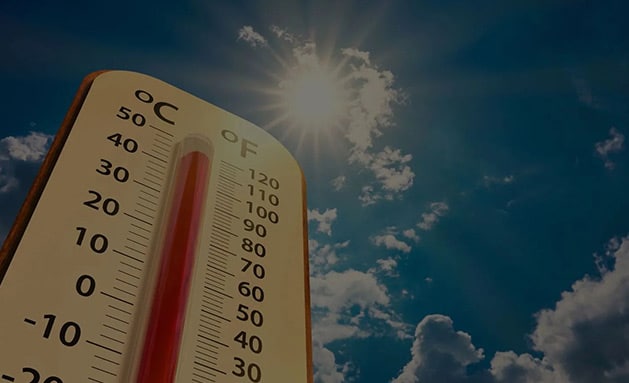Summer in Texas means boating, cookouts, camping, road trips, and…car crashes?
When temperatures rise, so does the prevalence of car accidents, a growing body of research shows. Heat places more stress on the body and can negatively affect our mental health, leading to reduced cognition, more judgment errors, lower dexterity, and increased aggressiveness.
These are serious concerns for people behind the wheel. And the way that cars trap heat can further amplify the risk of a crash when the mercury rises.
Texas Summers Are Getting Hotter
According to NASA, July 2023 was hotter than any other month in the global temperature record. Texas set numerous heat records last summer, and 2024 is shaping up to be another summer for the record books.
San Antonio had its hottest year on record in 2023 that included 75 days of triple-digit temperatures. Houston and San Antonio both recorded their hottest ever meteorological summers and Dallas had one of its top-three hottest summers on record.
Just a day before the official start of summer 2024, the Northern Hemisphere was running 1.9 degrees Fahrenheit above normal following the warmest January through May in 175 years of NOAA record-keeping.
Parts of Texas and much of the country just experienced their hottest June on record and July is off to a steamy start in many areas, with 110 million people in 21 states under heat watches and warnings for Independence Day.
Higher Temps Linked to Higher Crash Risk
Texans know how hot the summers are here. But they may not be aware of how hot weather can affect their driving.
TxDOT crash records show that, in 2023, June and August were the deadliest months on Texas roads, when 390 people were killed in traffic accidents. The deadliest day in Texas last year occurred in late summer, on September 9, a day that claimed the lives of 25 Texans.
A similar pattern emerges from 2022 TxDOT data. September was the deadliest driving month (427 persons killed), while the single-deadliest day was in July. The pattern also holds for 2021, as August claimed more lives (418) than any other month.
Are these meaningful signals or statistical noise? A simple explanation could be that there are more people—and in particular inexperienced teenage drivers—out on the roads in the summertime. AAA calls the period from Memorial Day to Labor Day the “100 Deadliest Days” for this very reason.
But there is mounting evidence that temps—every bit as much as teens—increase the chances of a deadly wreck.
We’ve all experienced irritability and brain fog on a hot summer day. The phenomenon is not just anecdotal—it’s backed by science.
According to Scientific American, researchers around the world have looked at how temperature relates to car crashes and noticed the same trend: hot weather raises the risk of car crashes and car accident fatalities.
A U.S. study, for example, found a statistically significant 3.4% association between heat waves and fatal traffic crashes. And a global analysis of road injuries attributable to high temperatures found that they notably increased from 1990 to 2019.
How Heat Affects Body, Mind, and Performance
You don’t feel like yourself when it’s hot. Everyday tasks become more difficult and exhausting and you may not think as clearly as you would in milder weather.
As scientists learn more about the specific ways that heat impacts not only our bodies, but our minds and emotional states, they’re providing evidence to support our intuitive understanding that extreme heat is unhealthy.
For example, social scientists have documented a phenomenon they call the “heat hypothesis.” This theory suggests that hot weather may increase angry, aggressive, and violent behavior. When people are angry, they tend to make risky decisions or act impulsively. They’re also more likely to take out their anger at something intangible—like a heatwave—onto something tangible (like another driver).
Other studies show that hot weather affects cognitive abilities and is linked to lower standardized test performance. One study found that, for each degree of temperature rise above 72°F, standardized test scores fell 0.2%. That may not sound like a lot, but it can add up in extreme heat.
Heat has been shown to result in more work injuries as well. Elevated core temperature and dehydration lead to physical fatigue, lethargy, irritability, impaired judgment, lowered vigilance, and loss of dexterity, concentration, and coordination, which can compromise occupational safety and lead to increased accidents, says the World Health Organization.
A recent study shows that work-related injuries occur more frequently on hotter days, whether the work is done indoors or outdoors. According to UCLA researchers, on days above 90°F, workers face a 6 – 9% higher risk of injuries compared to days in the 50s or 60s. That risk goes up by 10 – 15% in temperatures above 100°F.
A hot car, like a hot worksite, can lead to more accidents and injuries because of the way heat affects our physiology and cognition. And there are fewer places hotter than the inside of a car on a hot day.
Cars produce a localized “greenhouse effect” as vehicle surfaces soak up the sun and temperatures rise to dangerous levels. Even on a mild 77-degree day, a car sitting in the sun for an hour can record temperatures approaching 120°F. At an outdoor temperature of 96°F, the inside of a car can reach nearly 150°F, even when the air conditioning is used intermittently.
Temperatures in this range are life-threatening. And being in a hot car can make driving itself more deadly.
A 2014 Italian study investigated driving performance after a car had been left an unshaded parking lot and observed that drivers had difficulty with basic tasks like moving in a straight path and reacting to traffic signals.
Researchers say that these sorts of findings are more alarming in the context of climate change and the expected increase in high-temperature days. But there’s reason to believe people can adapt to the heat and that driving isn’t destined to become a demolition derby in a hotter world.
A 2021 study focused on Alabama determined that the state experienced fewer collisions on heat wave days than on days without extreme heat. The study author speculated that “people living in the South are more well-prepared for the heat.”
Turning Up The Heat on Insurance Companies
Texans are no strangers to heat—or to deadly car accidents. We have some of the hottest summers in the country and lead the nation in the number of fatal collisions.
It may be as “Hot as a summer day in Texas,” or, as locals are fond of saying, “Hot as Hades,” “Hotter than blue blazes,” or “Hotter than a stolen tamale.” But from a legal standpoint, you can’t blame a car accident on hot weather any more than you can on other types of extreme weather.
If you were in a car wreck on a Texas summer day, it may be appropriate to ask the other driver, “Hot enough for ya?” However, we don’t recommend this. We advise that you say as little as possible to anyone until you first talk to a car accident lawyer.
Jim Adler & Associates has been putting the heat on insurance companies since 1973, helping injured Texans get the compensation they deserve. For a free consultation, call 1-800-505-1414 or contact us.





